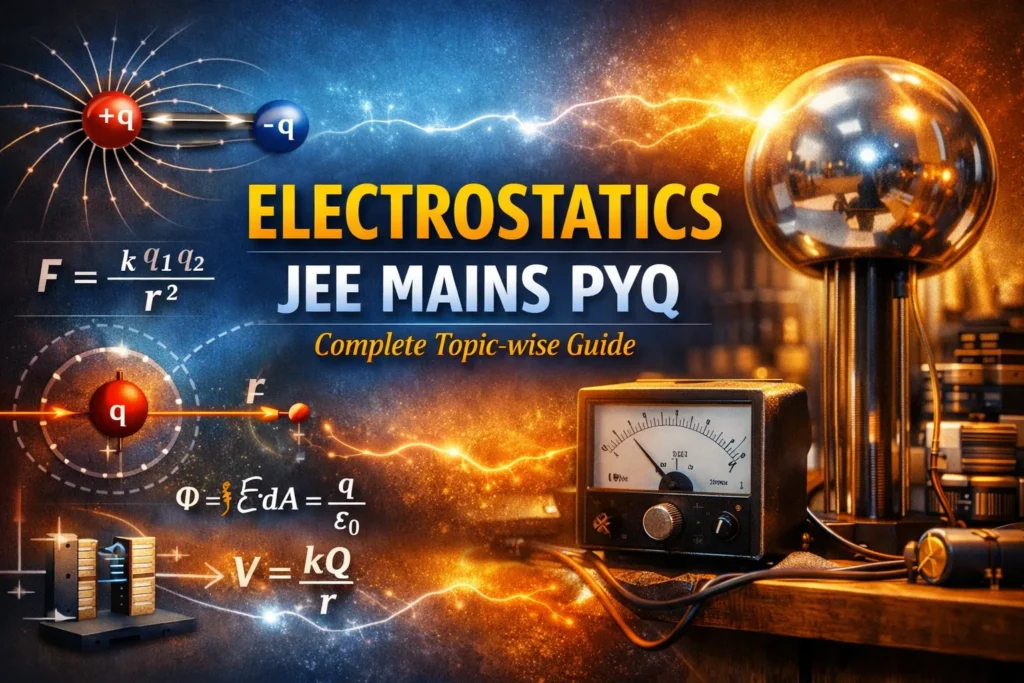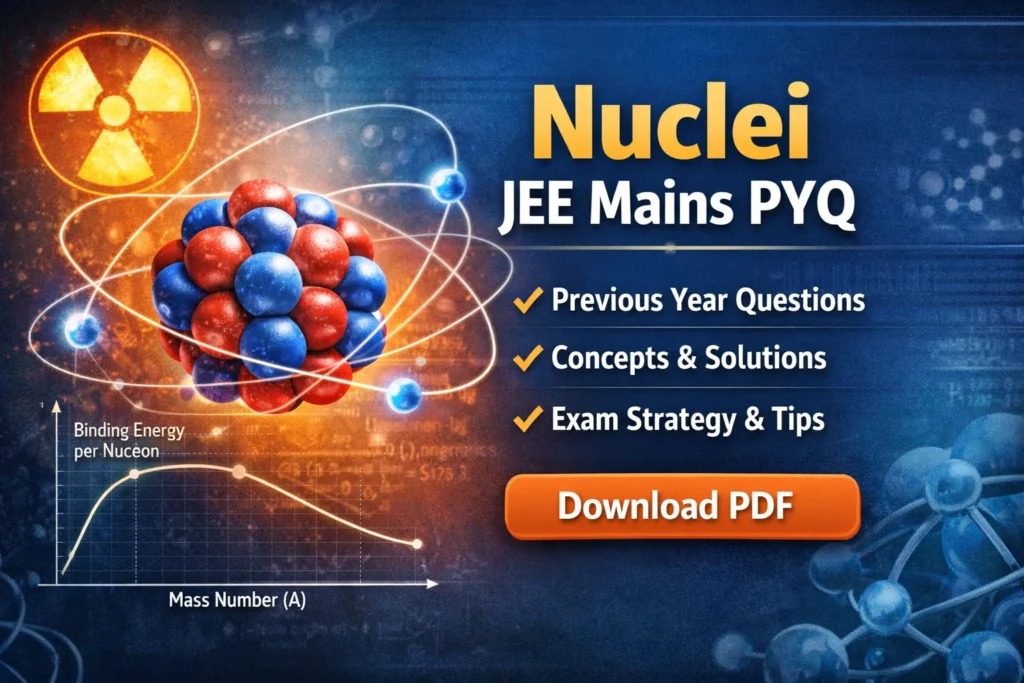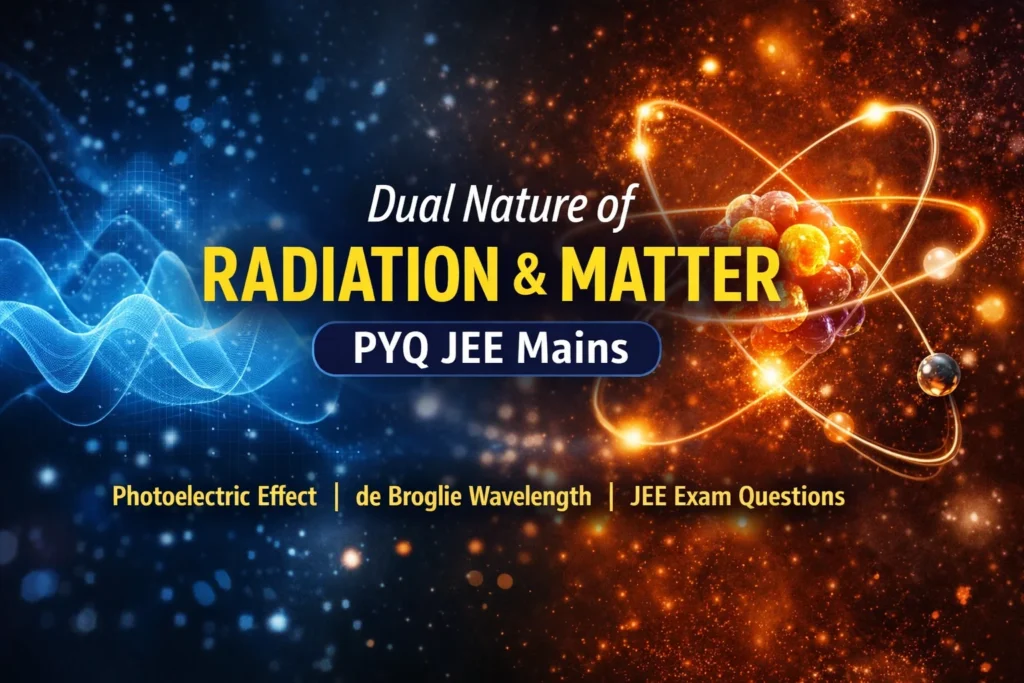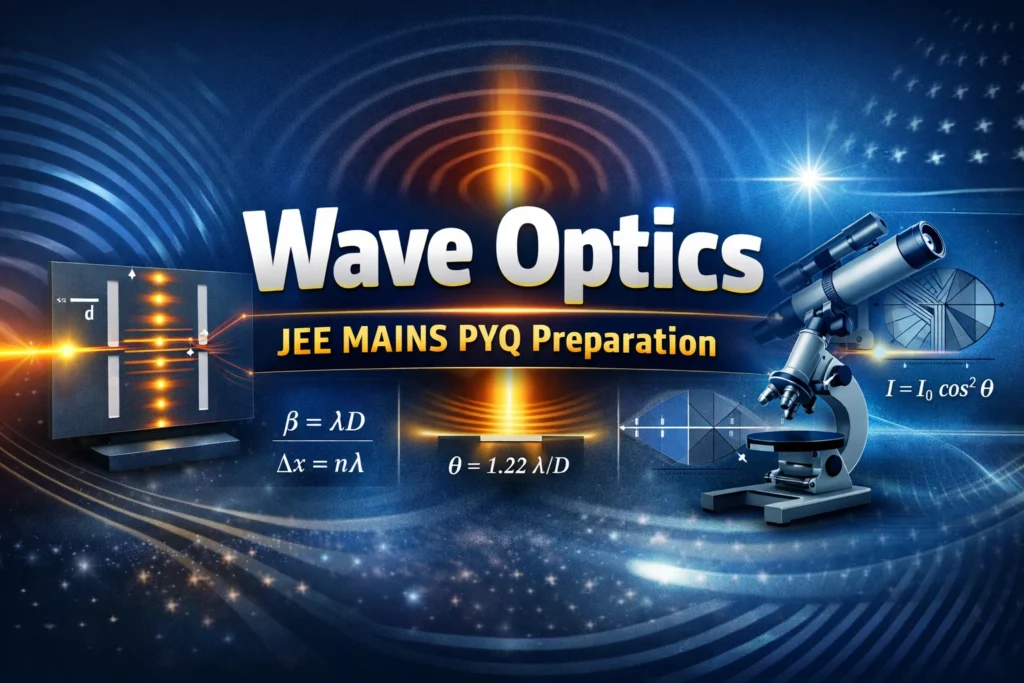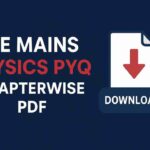📅 Published on: 26.08.2025
Table of Contents
ToggleJEE Mains Chemistry PYQ Chapterwise -overview
Preparing for JEE Mains Chemistry can feel challenging, especially with the vast syllabus covering Organic, Inorganic, and Physical Chemistry. One of the smartest strategies to score high is solving Previous Year Questions (PYQs) in a chapterwise format. This approach helps aspirants understand the weightage of each chapter, frequently asked concepts, and the type of numerical/analytical questions asked in the exam.
If you are looking for a JEE Mains Chemistry PYQ Chapterwise PDF, this guide will help you download, practice, and utilize these questions effectively for your preparation.

JEE Mains 24 Years PYQs + Toppers’ Notes (All Subjects) PDF
Only ₹299 — Instant Download
Get complete Physics, Chemistry & Mathematics PYQs (2002–2025) with Toppers’ Handwritten Notes, formula sheets & high-weightage questions — perfect for fast revision & score improvement 💯
📥 Instant email delivery • ✔ Works on mobile & laptop • 🔄 Lifetime access
JEE Mains Chemistry Chapterwise Weightage
Below is an approximate chapterwise weightage of Chemistry in JEE Mains based on past year analysis
Low-priority chapters: Environmental Chemistry, Surface Chemistry (kabhi-kabhi 1 question).
Chapter | Weightage (%) | Insights |
Chemical Bonding | 8% | Har saal 2 or 3 questions, mostly hybridization aur VSEPR se |
Thermodynamics | 6% | Numerical + theory dono aate hain, NCERT-based |
Coordination Compounds | 6% | Direct questions from VBT & CFT, high-scoring |
Atomic Structure | 5% | Quantum numbers, Bohrs model “ consistent weightage |
Equilibrium | 5% | Numericals + Le Chatelier principle |
Hydrocarbons | 5% | Mostly conceptual, SN1/SN2 aur Markovnikov rule |
Alcohols, Phenols, Ethers | 5% | Reaction mechanism-based questions |
Aldehydes & Ketones | 6% | Highly repeated topic, must-do |
p-Block | 7% | Group 15 & 16 most important |
d-Block | 4% | Trends + coordination overlap |
JEE Mains Chemistry Chapterwise PYQ PDF Download- Class 11
No. | File Name | Download Link |
1 | Some Basic Concepts of Chemistry | |
2 | Structure of Atom | |
3 | Classification of Elements and Periodicity | |
4 | Chemical Bonding and Molecular Structure | |
5 | States of Matter | |
6 | Thermodynamics | |
7 | Equilibrium | |
8 | Redox Reaction | |
9 | Hydrogen | |
10 | S-Block Elements | |
11 | P-Block Elements | |
12 | Organic Chemistry – Some Basic Principles | |
13 | Hydrocarbons |
See More…..
JEE Mains Chemistry Chapterwise PYQ PDF Download- class 12
Chapter | Download PDF |
1. Solid State | |
2. Solution | |
3. Electrochemistry | |
4. Chemical Kinetics and Nuclear Chemistry | |
5. Surface Chemistry | |
6.General Principles and Processes of Isolation of Elements | |
7. P-Block Elements (Groups 15-18) | |
8. D and F Block Elements | |
9. Coordination Compounds | |
10. Haloalkanes and Haloarenes | |
11. Alcohols, Phenols, and Ethers | |
12. Aldehydes, Ketones, and Carboxylic Acids | |
13. Amines | |
14. Biomolecules | |
15. Polymers | |
16,17. Principles Related to Practical Chemistry |
JEE Mains Chemistry Important Chapter-Wise Topics
1. Physical Chemistry
- Some Basic Concepts of Chemistry → Mole concept, empirical & molecular formula, stoichiometry.
- Atomic Structure → Bohr’s model, quantum numbers, electronic configuration, photoelectric effect.
- Chemical Bonding & Molecular Structure → VSEPR theory, hybridization, molecular orbital theory.
- States of Matter → Ideal gas equation, real gases, van der Waals equation.
- Thermodynamics → First law, enthalpy, entropy, Gibbs free energy, spontaneity.
- Equilibrium → Le Chatelier’s principle, pH calculations, ionic equilibrium, solubility product.
- Redox Reactions → Oxidation number, balancing redox reactions.
- Solutions → Raoult’s law, colligative properties, Henry’s law.
- Electrochemistry → Nernst equation, electrochemical cells, conductance.
- Chemical Kinetics → Rate law, order of reaction, activation energy, Arrhenius equation.
- Surface Chemistry → Adsorption, catalysis, colloids.
2. Organic Chemistry
- General Organic Chemistry (GOC) → Resonance, hyperconjugation, inductive effect, acidity/basicity.
- Hydrocarbons → Alkanes (free radical substitution), Alkenes (Markovnikov & Anti-Markovnikov rule), Alkynes.
- Haloalkanes & Haloarenes → SN1 & SN2 mechanisms, electrophilic substitution in haloarenes.
- Alcohols, Phenols & Ethers → Reactions of phenols, dehydration, Williamson’s synthesis.
- Aldehydes, Ketones & Carboxylic Acids → Aldol condensation, Cannizzaro reaction, nucleophilic addition.
- Amines → Basicity, diazotization, Hoffmann bromamide reaction.
- Biomolecules → Carbohydrates (glucose/fructose structure), proteins (amino acids, enzymes).
- Polymers → Addition & condensation polymers, examples (nylon, bakelite, PVC).
- Chemistry in Everyday Life → Drugs (antibiotics, analgesics, antiseptics), detergents.
3. Inorganic Chemistry
- Periodic Table & Periodicity → Trends in ionization enthalpy, electronegativity, atomic size.
- Hydrogen → Hydrogen bonding, hydrides, heavy water.
- The p-Block Element → Group 13 (Borax, diborane), Group 14 (silicones, CO₂ chemistry), Group 15 (NH₃, HNO₃, P₄), Group 16 (O₂, SO₂, H₂S), Group 17 (interhalogens, oxoacids), Group 18 (uses of noble gases).
- The d-Block Element (Transition Elements) → Electronic configuration, oxidation states, magnetic properties, coordination compounds.
- The f-Block Element (Lanthanides & Actinides) → Oxidation states, color, actinide contraction.
- Coordination Compounds → Nomenclature, VBT, CFT, isomerism, magnetic properties.
Best Books to Practice JEE MAINS Chemistry PYQs chapterwise
Apart from the chapterwise PDF, aspirants should also refer to standard books:
- NCERT Chemistry (Class 11 & 12) – Must-read for concept clarity.
- MTG Chapterwise PYQ Book – Covers solved PYQs with explanations.
- Cengage Chemistry for JEE Mains & Advanced – For in-depth practice.
- OP Tandon Physical Chemistry – Best for numerical practice.

Shop Now
MTG 48 + 24 Years JEE Main (2025-2002) and JEE Advanced (2025-1978) Chapter-wise Topic-wise Previous Years Solved Papers Chemistry Book

Shop Now
PW JEE Main 7 Years (2019 - 2025) Chemistry All 144 Shifts Online Previous Years Solved Papers Chapterwise and Topicwise PYQs For JEE Main 2026 Exams

Shop Now
Arihant 24 Years JEE Main Chemistry Chapterwise Topicwise PYQ with 3500+ MCQ | Verified Answer by NTA, Solution with Key Idea, Concept Enhancer and Alternate Solutions and Difficulty Level Sorting of PYQ

Shop Now
Disha's 183 New Syllabus Chapter-wise & Topic-wise JEE Main Chemistry (2025 - 2002) Previous Year Solved Papers 9th Edition | JEE Mains PYQ Book for 2026
Why Solve JEE Mains Chemistry PYQ Chapterwise ?
1.Identify Important Chapters –
By solving PYQs, you can see which chapters carry maximum weightage. For example, chapters like Chemical Bonding, Thermodynamics, and Coordination Compounds are frequently asked.
2.Understand Exam Pattern
PYQs show how questions are framed, making it easier to tackle MCQs within limited time.
3.Improve Speed & Accuracy –
Regular practice boosts time management and reduces negative marking.
4.Revision Made Easy –
Chapterwise PDFs help students revise specific topics instead of random question sets.
5.High Scoring Subject –
Chemistry is often the rank booster in JEE Mains because questions are more concept-based than calculation-heavy.
Strategy for JEE Mains Chemistry Preparation
Chemistry is often considered the most scoring subject in JEE Mains because questions are more concept-based and memory-oriented compared to Physics and Maths. With the right strategy, students can easily score 70+ out of 100 in Chemistry.
1. Build Strong NCERT Foundation
- Focus on NCERT Class 11 & 12 Chemistry as it forms the backbone of JEE Mains.
- In Inorganic Chemistry, almost every question comes directly from NCERT. Highlight and revise important reactions, exceptions, and trends.
- In Organic Chemistry, learn all named reactions, mechanisms, and important conversions directly from NCERT.
2. Jee mains chemistry PYQ chapterwise Practice
- After finishing each chapter, solve Previous Year Questions (PYQs) in a chapterwise format.
- This helps identify frequently asked topics like Coordination Compounds, Thermodynamics, Chemical Bonding, Aldehydes & Ketones, and the p-Block elements.
3. Time Division for Chemistry Sections
Chemistry can be divided into three parts, and each requires a different approach:
- Physical Chemistry → Practice numerical problems daily (Thermodynamics, Equilibrium, Electrochemistry).
- Organic Chemistry → Focus on mechanisms, named reactions, and reaction intermediates. Make short notes of reagents and their uses.
- Inorganic Chemistry → Revise NCERT line by line. Memorize periodic trends, important compounds, and exceptions.
4. Regular Revision
- Make short notes for formulas (Physical), reaction mechanisms (Organic), and important compounds (Inorganic).
- Revise these notes weekly to avoid forgetting.
- Use flashcards for Inorganic Chemistry to memorize reactions and exceptions quickly.
5. Mock Tests & Time Management
- Attempt full-length mock tests regularly to improve speed and accuracy.
- Try to complete the Chemistry section in 35–40 minutes during the exam, leaving more time for Physics and Maths.
- Analyze mistakes after each test and revise weak areas.
6. Focus on High-Weightage Chapters First
Based on PYQ analysis, chapters like Chemical Bonding, Coordination Compounds, Thermodynamics, Equilibrium, Hydrocarbons, and Aldehydes & Ketones carry higher marks weightage. Prioritize these before low-weightage topics.
7. Daily Study Routine (2–3 Hours for Chemistry)
- 1 hour → Revise NCERT + short notes.
- 1 hour → Solve PYQs from one chapter.
- 30–40 mins → Practice 15–20 MCQs from mock tests/books
Conclusion
Practicing JEE Mains Chemistry PYQ Chapterwise PDFs is a proven method to boost your score. It helps in understanding the exam trend, important chapters, and question-solving approach. With consistent practice of PYQs, NCERT revision, and mock tests, Chemistry can turn into your rank-boosting subject in JEE Mains 2026 and beyond.
📥 Download your JEE Mains Chemistry PYQ PDFs now from allexampyqs.com and start smart preparation today.
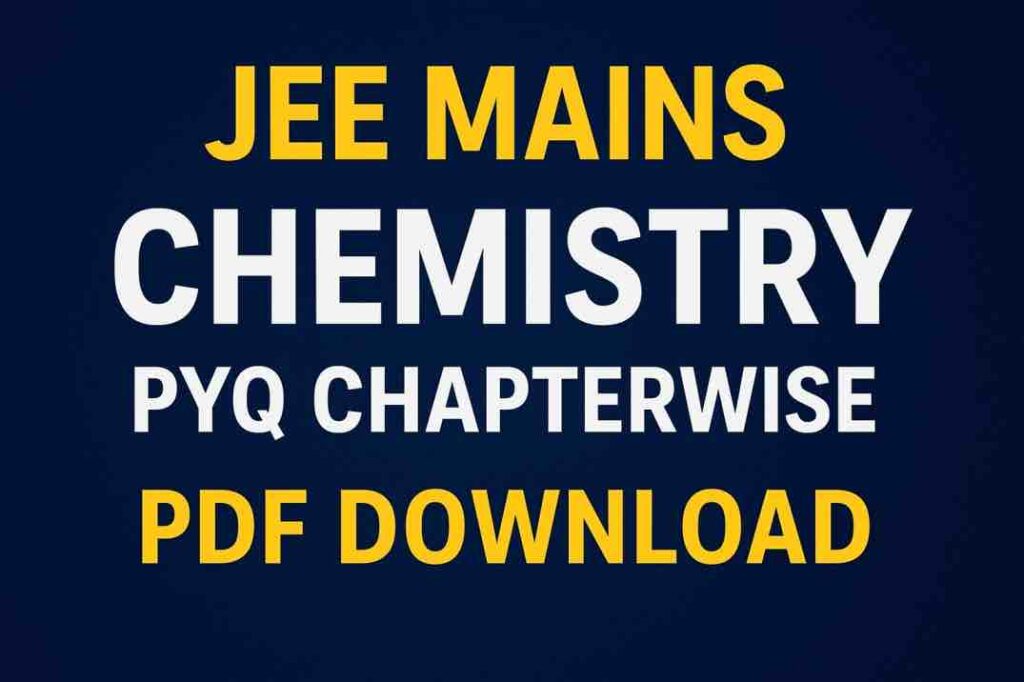
FAQs on JEE Mains Chemistry PYQ Chapterwise
Q1. Where can I find JEE Mains Chemistry PYQ Chapterwise PDFs?
You can download JEE Mains Chemistry PYQ Chapterwise PDFs from trusted exam resources and websites. These PDFs provide organized previous year questions arranged chapter by chapter for better preparation.
Q2. Which chapters are most important in JEE Mains Chemistry PYQ Chapterwise practice?
Important chapters include Chemical Bonding, Thermodynamics, Coordination Compounds, Organic GOC, Aldehydes & Ketones, and the p-Block elements. These chapters have the highest weightage in JEE Mains Chemistry PYQ Chapterwise analysis.
Q3. How many years of JEE Mains PYQ should I solve?
Ideally, aspirants should solve at least the last 10–12 years of JEE Mains PYQ. This covers all repeated topics and gives a strong command over important chapters.
Can I clear JEE Mains by practicing only PYQs?
Practicing JEE Mains PYQs gives you a huge advantage, but it should be combined with NCERT and standard books for concepts. PYQs show trends, while books strengthen your fundamentals.


